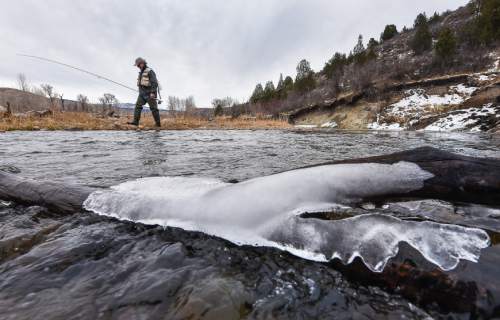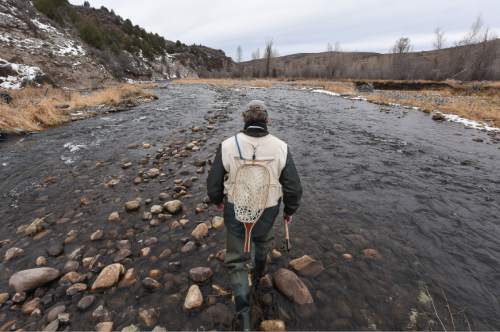This is an archived article that was published on sltrib.com in 2016, and information in the article may be outdated. It is provided only for personal research purposes and may not be reprinted.
Legal access to miles of trout streams slammed shut this week when the Utah Supreme Court reauthorized private landowners to prevent anglers from walking along streams flowing through their property.
A recent ruling by 4th District Judge Derek Pullan temporarily opened public access to those streams, with the judge declaring that the "unfittingly named" 2010 Utah Public Waters Access Act violates the Utah Constitution by denying the recreating public from a resource that the state must manage in the interest of all Utahns.
VR Associates, which owns a luxury destination on a 4-mile stretch of the Provo River known as Victory Ranch, is appealing Pullan's ruling, which Nathan Thomas, a lawyer for VR Associates, says is "premised on various erroneous conclusions."
But until his client's inevitable victory, Thomas wrote in a court filing, "VRA, other private landowners, the state, and the recreating public are all harmed through a deprivation of their property rights, the right to the benefit of duly enacted legislation, and ambiguity as to the scope of the public's rights."
Thomas says recreational use was not envisioned by the authors of the Utah Constitution when they described public easements to ensure access to water back in the 1890s. They were thinking of irrigation and commerce. He also contends the invalidated statute merely regulates the public easement to streams, not "dispose" of it; nor is the public's interest even impaired by the law since it leaves about 3,700 miles of fishable stream accessible.
Granted without comment on Wednesday, the stay is the Utah Stream Access Coalition's first set back in its five years of litigating against the Utah Public Waters Access Act. The group said it was disappointed, but not surprised by the move since the high court sometimes errs on the side of caution when it comes to upsetting the status quo. Its leaders cautioned members and supporters to resume seeking permission before fishing rivers on private property.
"It is of the utmost importance that we follow [stay]. Respect private property and obey all 'No Trespassing' signs. Our actions must continue to be above board," the coalition posted on social media. "We remain confident in our legal arguments before the court, and we will continue to pursue all means possible to restore and preserve access to Utah's public rivers and streams."
Coalition lawyer Craig Coburn unsuccessfully argued that Victory Ranch has no standing to seek a statewide stay, just one that applies to its four miles on the Upper Provo above Jordanelle Reservoir.
HB141, the 2010 statute at the heart of the dispute, "prohibited and criminalized virtually all forms of public access to and use of 2,700 miles of Utah's fishable public water that traverse ostensibly private stream beds," Coburn wrote in his filings. Pullan had agreed the law went too far, concluding it put 43 percent of the state's fishable streams off limits to the public.
The law increased fishing pressure on streams crossing public grounds, affecting up to 230,000 Utah resident anglers who surveys suggest would otherwise fish streams like the Provo that flow over private land.
Last year, the coalition won a related lawsuit regarding the question of navigability on the Weber River. This ruling out of 3rd District Court declared that streams are in essence public if, at the time of Utah statehood in the 19th century, they were used seasonally to float logs. Earlier this month, the Supreme Court consolidated appeals associated with these cases.
Back in November, the Utah Division of Wildlife Resources offered guidance to anglers puzzled over shifting rules, advising them to stick to beds of streams when crossing private lands and demonstrate respect to landowners. The best advice now is to access private streams only from public access points or after obtaining permission.
Victory Ranch alleged that anglers showed up on its banks within days of Pullan's ruling and many "exceeded the bounds of what is explicitly permitted. This will likely continue until clarity is provided regarding the scope of the public's easement," Thomas wrote. "The public has an interest in seeing laws enacted by its representative upheld and enforced. Similarly, private landowners — members of the public themselves — have an interest in assuring that the full scope of their constitutional rights are enforced, absent direction from the Supreme Court to the contrary."
Brian Maffly covers public lands for Salt Lake Tribune. Maffly can be reached at bmaffly@sltrib.com or 801-257-8713.
Twitter: @brianmaffly





